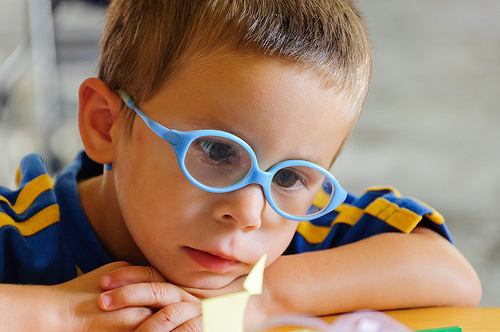Basic information about child vision that every parent should know.
As we get older, we begin to experience subtle changes and adjustments to our bodies that are strange and unfamiliar to us. For instance, in college, you may have been able to scarf down an entire pizza without gaining a pound. But, as you begin to age and your metabolism adjusts itself, it seems like you can’t even look at a slice of cheesy pepperoni pizza without jumping up a pant size.
However, our health and our body type are not the only things that make strange adjustments as we get older. Our vision also starts to steadily decline and many people will find that they have to start wearing glasses or contact lenses for the first time.
Luckily, as adults, we are very aware of changes that are happening to our bodies, and therefore we are able to make the necessary adjustments to ensure that it does not interfere with our day-to-day lives. Children, on the other hand, are not quite as aware of the changes and adjustments to their bodies.
During a child’s early weeks of life, their vision is still developing and changing on a regular basis. However, by the time they reach the age of six months, kids have reached enough developmental milestones to indentify basic vision problems that may have an effect on their learning and their health.
Unfortunately, while many parents will book pediatrician appointments months in advance, many children will not visit an optometrist until they are well over a year of age. However, with the help of regular vision screenings and eye care, proper steps can be taken to rectify any vision problems that children may experience early on.
Here are just a few more important facts about child vision and just how important it can be in your child’s early years:
Baby’s Need Vision Tests Too
By the time a child reaches the age of six months old, they should have already received their first vision test. During this initial check up, eye doctors will check for signs of common vision problems, such as amblyopia (lazy eye), nearsightedness or farsightedness, strabismus (crossed-eyes), and more.
Also, while cataracts are typically a serious vision problem that affect people over the age of 60, it is also possible for cataracts to be present at birth. Luckily, as long as these vision problems are indentified early enough, proper steps can be taken to ensure that your child is not affected by them.
Vision Plays A Large Role In Learning and Cognitive Development
According to All About Vision, more than 80% of what a child learns in school is presented visually. Also, more than 20% of kids (or one out of every five children) aged 12 to 17 have trouble seeing the classroom chalkboard.
Following proper vision practices for your children can make a huge difference in their cognitive functions and academic performance. If a child continues through school with problems in their vision, they can experience great difficulty in their learning, especially in their reading.
We here at OCLI want to ensure that your children start out healthy and happy in their first few years of life. Through our pediatric vision exams, we will not only work to identify any problems that may be affecting your child’s eyesight, but we can help to ensure that your child will not be plagued by the side effects of poor vision. Contact us today to set up your child’s very first pediatric eye exam and know that they are in the best hands possible.
Image: Source
